
Education Minster At ARSD: Atma Ram Sanatan Dharma (ARSD) college conducted its 66th Foundation day on Saturday and what was initially expected to be a regular celebratory reunion took a reflective turn when Delhi's Education minister Ashish Sood talked about the "most important education reforms in decades" and asked students how they are going to contribute to the college, society and country.
Back at the campus where he once studied commerce in the 1980s, Sood told students that the purpose of college isn't just to accumulate degrees, it's to prepare for real responsibility. "The three years of college are when you enjoy the most freedom," he said. "But life after that comes with responsibilities. Now is the time to ask yourself, how are you going to contribute to your college, your society, and your country?"
The speech hit a personal note, with Sood calling his return to ARSD as Chief Guest a "deeply emotional moment," adding, "My foremost identity is that of an alumnus of this college, and I take great pride in that." But beyond the nostalgia, his message was sharply focused on the future, especially through the lens of the National Education Policy 2020.
Calling NEP 2020 "a generational shift," the minister said the new policy is designed to transform not just what students learn, but how they learn. From interdisciplinary subject combinations to skill-based education, from academic flexibility to credit transfer and breaks, Sood said the reforms aim to put students at the center of the education system. "This policy isn't just about changing syllabi, it's about changing mindset. We are no longer in a world where just having a degree is enough," he said. "We need thinkers, problem-solvers, communicators, not just test-takers."
He also mentioned Delhi's recent push to implement NEP at the grassroots level, including through pilot projects that integrate internships into credit systems and establish school-level skill labs. Mental health services on campus, he added, were also being reviewed as a priority following post-pandemic concerns among students.
Referencing the name and founding values of Atma Ram Sanatan Dharma College, the minister said Sanatan Dharma is not just a religious term, but one that represents eternal truths and social responsibility. "When some people talk about ending Sanatan, it is our duty to uphold and reestablish these timeless values by becoming their torchbearers," he said.
While the minister's remarks were largely focused on student responsibility and institutional values, he also touched on current policy moves aimed at school-level reform. Beginning tomorrow, the Delhi Assembly will take up a long-awaited bill to regulate private school fee structures, a proposal that is expected to impact thousands of parents across the capital. Education Minister himself is set to table the bill, based on an ordinance cleared by the Cabinet on April 29.
The proposed legislation introduces financial penalties for arbitrary fee hikes by private schools, ranging from Rs. 1 lakh to Rs. 10 lakh, and mandates refunds within 20 working days. Delays in processing refunds would trigger escalating penalties, while repeated violations could disqualify school authorities from revising fees or holding administrative office. The bill outlines a three-tier regulatory structure, school-level, district, and revision committees, with the latter having final authority in disputes. While some parents have welcomed the bill's intent, many say there needs to be deeper public dialogue before implementation.
For students at ARSD, however, it was the focus on NEP and purpose-driven education that stood out. "Finally, someone's talking about how we study, not just what we study," said a second-year student. "We're tired of the placement rat race. If NEP can help us figure out what we actually want, that's real reform."
Wrapping up his address, Sood quoted Acharya Chanakya: "A teacher is never ordinary, both destruction and creation lie in their lap." He thanked the college's past and present faculty for shaping thousands of young minds since 1959 and left students with one final reflection. "If we get NEP right," he said, "Delhi's students won't just pass exams, they'll shape the future."
As the event drew to a close, Sood's message was clear: education reform won't mean much unless students are active participants, not passive recipients. "If we get NEP right," he said, "Delhi's students won't just pass exams, they'll shape the future."
But as with most reforms, the impact will depend on what happens after the speeches. With the Assembly set to take up the private school fee regulation bill tomorrow, and NEP implementation still uneven across campuses, the coming weeks may reveal whether policies like these translate into real change, or remain distant headlines for students navigating everyday challenges.
For many in the crowd, the takeaway was less about nostalgia and more about ownership. "Everyone talks about jobs and marks. It was different to hear someone ask us to think about our role in society," said a student. "College shouldn't just be a waiting room for placements, and if NEP delivers, maybe it won't be."
